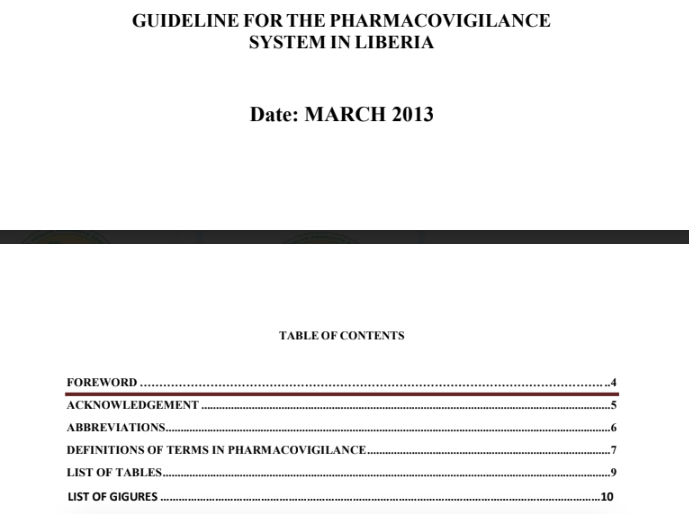Fill out the form below to receive the complete PDF guide directly in your inbox. This resource provides clear, step-by-step guidance to help you make the most of the information we’ve prepared for you.
Liberia
GUIDELINE FOR THE PHARMACOVIGILANCE SYSTEM IN LIBERIA
The guideline outlines the structure, coordination, and operation of the National Pharmacovigilance (PV) System in Liberia, established under the Liberia Medicines and Health Products Regulatory Authority (LMHRA) Act of 2010. Its core mandate is to promote the controlled reporting and monitoring of Adverse Drug Reactions (ADRs) to ensure the safety, efficacy, and quality of medicines circulating in the Liberian market. It defines roles and responsibilities for various stakeholders, including healthcare workers, pharmaceutical industries, and investigation teams. The document details essential tools for PV, such as ADR reporting forms, severity assessment scales, and causality assessment cards.

Use Cases
- LMHRA (Liberia Medicines and Health Products Regulatory Authority) – System Coordination and Regulation: They manage the National Pharmacovigilance Center, review incoming reports, and utilize the data to take regulatory actions like issuing drug alerts.
- Health Care Workers – Detect and Report ADRs: They are in the best position to recognize, document, and report suspected Adverse Drug Reactions (ADRs) and Poor Quality Medicinal Products to the appropriate investigation teams.
- Pharmaceutical Industries – Safety Monitoring and Compliance: They are expected to cooperate with the National PV system by submitting safety data and actively participating in the surveillance of their products once marketed.
- District Investigation Team (DIT) – Local Verification and Causality Assessment: They receive initial reports from healthcare facilities, conduct first-line investigations of reported ADRs, and perform causality assessments at the local level.
- Patients/Public – Report Medication Safety Issues: They are key stakeholders encouraged to report any untoward effects or suspicions related to the use of medicines to healthcare providers or directly to the system.
- Expert Safety Review Panel (ESRP) – Scientific Review and Recommendation: This body provides specialized clinical and scientific expertise to the LMHRA by assessing complex safety issues and recommending regulatory actions.
Key takeaways you'll learn
The resource’s purpose is to establish a robust, nationwide system for detecting, assessing, understanding, and preventing adverse effects and other problems related to medicinal products for human use. It aims to ensure that medicines remain safe and effective throughout their entire lifecycle in Liberia.
- Centralized National Hub: The National Pharmacovigilance Center (NPC) is officially recognized and centralized within the LMHRA to serve as the national hub for collecting, collating, analyzing, and advising on all drug safety information.
- Scope Beyond ADRs: The system’s reporting scope is explicitly expanded to include Poor Quality Medicinal Products, indicating a broader mandate than just Adverse Drug Reactions (ADRs).
- Mandatory Involvement: The guideline mandates active participation and defines specific roles for a wide range of stakeholders, including the patient/public, healthcare workers, County Pharmacists, and Public Health Programs (like NACP and NMCP).
- Focus on Investigation: A structured, tiered investigation mechanism is established, involving District Investigation Teams (DIT) and County Investigation Teams (CIT) to investigate serious reports and assess causality locally.
- Essential Tools Provided: The guideline incorporates and re-looks at specific, crucial PV tools, such as the ADR Severity Assessment Scale, Causality Assessment Card, and Patient Alert Card to ensure standardized reporting and decision-making.


